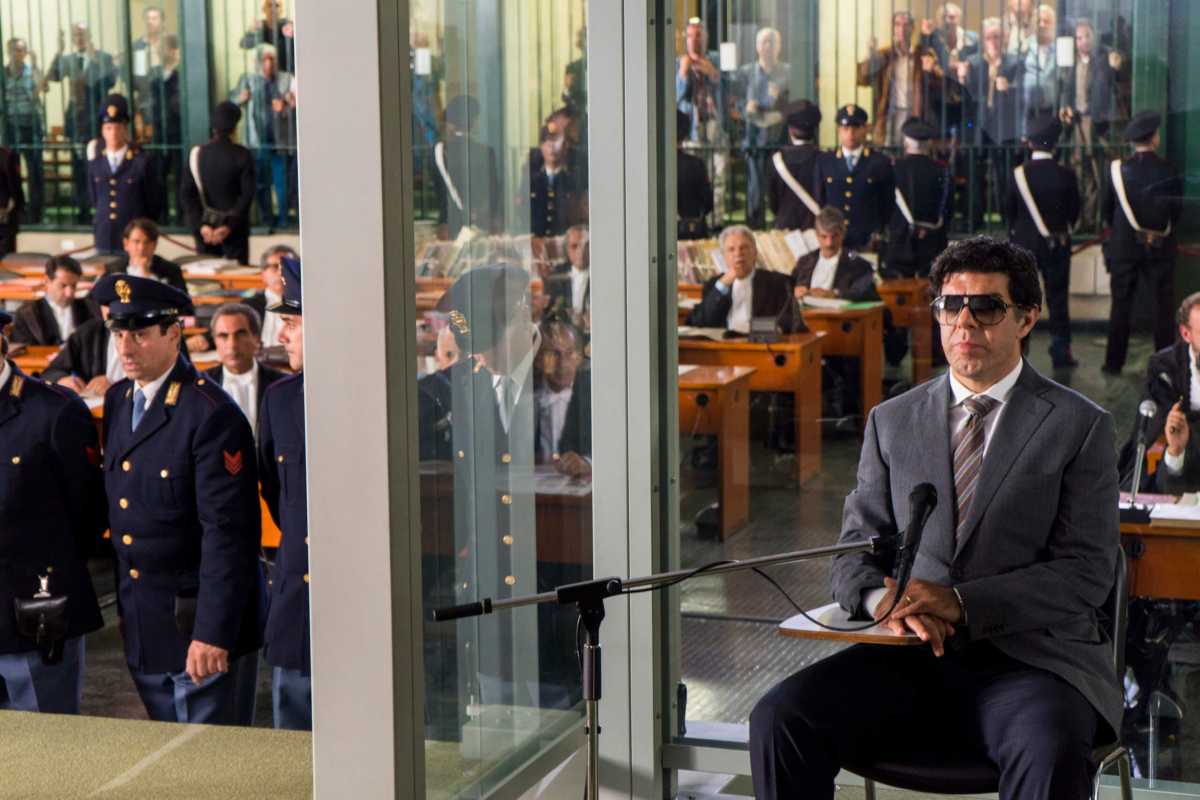Italian director Marco Bellocchio’s “The Traitor” runs in dialogue with a long history of gangster movies. It also continues his lifelong project of interrogating the history and institutions of Italy. The subject of the Mafia allows the two notions to intersect, but it also critiques the vision of the mob presented in “The Godfather” and other American films — which were heavily influenced by Italian filmmakers like Luchino Visconti and Bernardo Bertolucci, to bring things full circle. “The Traitor” has the same epic sweep and even includes a crime family called the Corleones, but Bellocchio avoids operatic excess, keeping emotion at a remove.
Based on a real person and events, “The Traitor” begins at a family party in 1980. An intertitle informs us about the Mafia’s involvement in heroin dealing, claiming that the Sicilian city of Palermo was that drug’s world capital. As much as Francis Ford Coppola tried to critique American society by tying together legal and illegal business, he romanticized Don Corleone by having him moralistically reject drug dealing. Here, the impact of heroin has even reached the son of the title character, Tommaso Buscetta (Pierfrancesco Favino). From this opening scene, “The Traitor” spins a web of violence that wipes out most of Buscetta’s relatives and associates. Arrested at his home in Brazil, he is captured and deported to Italy. Seemingly disgusted, he turns to Judge Giovanni Falcone (Fausto Russo Alesi) and turns on the Mafia, leading to a lengthy trial.
The first third of “The Traitor” does not stint on violence. Each time a man is killed, the film runs down the seconds leading up to his murder in the screen’s bottom left corner. This generates a queasy suspense; every time numbers appear onscreen, we know that someone is about to get wacked, but we don’t always know who. These murders are gory but quick and meaningless. Buscetta is tortured in jail, even being dangled from a helicopter over the sea and forced to watch his wife face the same potential fate. He attempts suicide by poisoning himself with strychnine to escape such treatment.
Movies and TV love to depict violent men, while rarely showing the possibility of such guys really changing. If the destructive effects of traditional versions of masculinity were a running theme in the films of 2019 (and have been one in the entire history of cinema), finding solutions for them is a much greater challenge than showing their danger. “The Sopranos” initially held out the promise that psychiatry could change Tony Soprano for the better, but it wound up concluding that a deeper understanding of himself just enabled him to be crueler. Bellocchio generates a great deal of tension from the path Buscetta finds himself on. The character genuinely feels insulted when someone uses the term “Mafia,” insisting that it’s a false invention of the press and that he’s a “man of honor” who belongs to the Cosa Nostra.
Buscetta realizes that he’s part of a thoroughly corrupt institution that holds tremendous power in his country. “The Traitor” continues down the road begun by the critique of the media, military, and organized religion Bellocchio made in his ‘70s films. (He could have made a similar film about a priest who becomes disillusioned with the Catholic Church.) The narrative force of “The Traitor” grinds to a halt for its detour through the courtroom, but as critic Filipe Furtado wrote, “The main trial has some of Bellocchio’s best carnivalesque filmmaking, a suspended space where legal procedural matters more in how revealing every gesture is than in the specifics of the case that the film takes as a given the audience is already aware of.” Held in a bulletproof box, Buscetta risks being overshadowed by a vulgar spectacle that includes one prisoner who has sewn his mouth shut and another who takes off all his clothes to expose his penis to the judge. The ghosts of Fellini and Pasolini are not far away.
“The Traitor” stretches over two and a half hours and 20 years (not counting brief flashbacks). Despite that running time, it denies us any real intimacy with Buscetta. Bellocchio keeps his characters at arms’ length. Even as the film ends, it retains its essential enigmas. Buscetta’s actions led to hundreds of gangsters being arrested. Does it matter that he comes across as grossly self-serving if he staunched the trail of blood flowing across the film’s opening act? “The Traitor” suggests how difficult and partial positive change can be, but makes a case for its necessity anyway.
THE TRAITOR | Directed by Marco Bellocchio | In Italian, Portuguese, and English with English subtitles | Sony Pictures Classics | Opens Jan. 31 | Film Forum, 209. W. Houston St.; filmforum.org | Film at Lincoln Center, 144 & 165 W. 65th St.; filmlinc.org



































